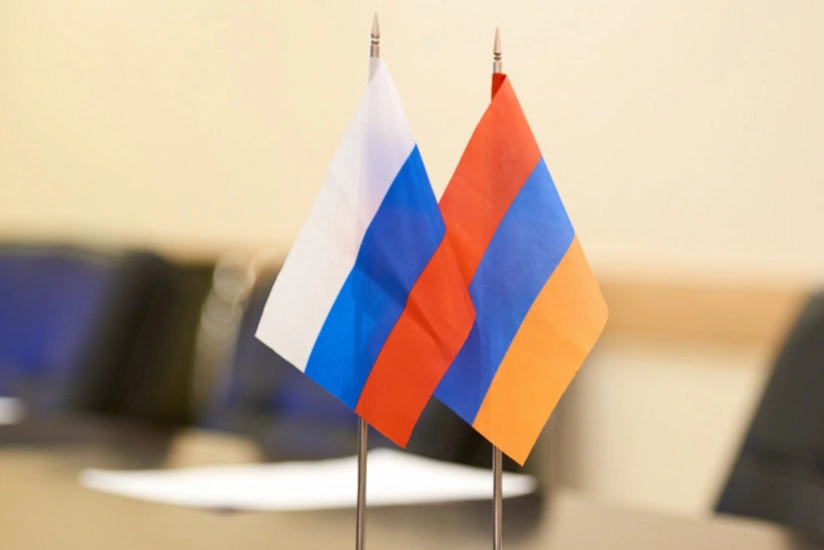Azerbaijani NGOs call on US and EU to strengthen control over Armenia's trade operations
- 17 September, 2024
- 07:17

In an open letter addressed to the leaders of key US and European Union structures responsible for imposing and monitoring sanctions against Russia, Azerbaijani non-governmental organizations (NGOs) have called for stricter control over Armenia's trade operations, Report informs.
"We, the undersigned non-governmental organizations (NGOs) of Azerbaijan, appeal to you to express our serious concern about the activities of the Republic of Armenia, which have allowed Russia to evade international sanctions imposed in connection with the Ukrainian war. These sanctions, imposed by Western countries, are aimed at holding Russia accountable and preventing a humanitarian crisis. The Armenian authorities violate the requirements of international law by pursuing a hypocritical policy and deepening the humanitarian crisis in Ukraine, supporting Russia in evading sanctions.
Following the onset of the Russia-Ukraine war in 2022, Armenia, which has the smallest foreign trade turnover in the South Caucasus, has experienced a sharp increase in both imports and exports, a rise that seems disproportionate to its economic potential. As the scope of sanctions imposed by the European Union and the United States on the Russian Federation expands, international reports have highlighted the notable increase in Armenia's foreign trade turnover with Russia.
The dramatic shift in Armenia’s trade goods and geographical structure from 2021 to 2023 is linked to efforts to bypass sanctions imposed on Russia by Western countries. In 2021, Armenia’s foreign trade turnover with Russia increased by 24.2% compared to 2020, reaching 2.6 billion USD. In 2022, this turnover surged by 93.4% compared to 2021, reaching 5 billion USD. By 2023, it further increased by 45.7% from 2022, reaching 7.3 billion USD. According to Alexey Overchuk, First Deputy Prime Minister of Russia, at the meeting of the intergovernmental commission on economic cooperation between Russia and Armenia, the trade turnover between the two countries is projected to reach 14-16 billion USD in 2024. If this forecast proves accurate, the foreign trade turnover between Armenia and Russia will have increased up to eightfold compared to 2020.
According to the State Statistics Committee of Armenia, exports to Russia in 2022 increased threefold compared to 2021, totaling 2.4 billion USD. In 2023, exports grew by 43.1% compared to 2022, reaching a historical high of 3.4 billion USD. From 2010 to 2020, the growth rate of Armenian exports to Russia averaged 18.6%, whereas, from 2020 to 2023, this rate soared to 64%.
While Russia's share of Armenia's exports did not exceed 27% in 2021, it increased to 40-44% in 2022-2023. This shift is attributed to Armenia’s strategy to circumvent sanctions by importing goods and products from various European Union countries, the Arab Gulf, and leading Asian nations for export to Russian markets. In 2023, for example, 14.7% (499 million USD) of Armenian exports to Russia were telecommunication devices, 11.1% (378 million USD) were passenger cars, 7.39% (250 million USD) were monitors and projectors, 2.54% (86 million USD) were calculating machines and their components, and 1% (31 million USD) were vacuum cleaners. Overall, 91% of electromechanical and machinery equipment exported by Armenia is sent to Russia. Additionally, compared to 2022, in 2023, exports of nuclear reactors, equipment, and mechanical devices to Russia increased tenfold, exports of optical, photographic, cinematographic, and medical surgical instruments rose fivefold, aircraft, spacecraft, and parts doubled, while exports of ships, boats, and floating structures increased eighteenfold, musical instruments thirty-eightfold, watches twenty-eightfold, and art objects and collectibles nineteenfold. None of these goods are produced in Armenia, and most of these products were not exported to Russia before 2022.
Despite the European Union's sanctions against Russia, several EU countries continue to conduct trade with Russia through Armenia. Remarkably, trade between Armenia and the EU increased 2.4 times in 2023 compared to 2021, with significant growth noted in trade with several Eurozone countries. Specifically, Armenia’s exports to Greece increased 39 times, and exports to Cyprus rose 24 times from 2021 to 2023. This situation raises questions about how, on one hand, the EU and the US impose sanctions on Russia, while on the other hand, the countries enforcing these sanctions are involved in Armenia's trade with Russia. Indirectly, by providing Russia with a “trade lifeline,” Armenia is also financing Russia’s war in Ukraine.
Since the first EU sanctions against Russia were adopted in March 2014, they have been periodically updated and extended. On 28 November 2022, the Council of the European Union unanimously decided to add “violations of EU sanctions” to the list of “EU crimes” referred to in the Treaty on the Functioning of the European Union (“TFEU”). One of the elements of the European Union's 11th sanctions package, adopted on June 23, 2023, which is among the sanctions isolating Russia from Western economies, and a special tool for combating evasion, is the control and restrictions on import-export operations. The list of supporters of Russia’s aggression against Ukraine, attached to the said sanctions package, also includes information about a legal entity registered in Armenia (Annex 4 to EU Regulation No. 833/2014).
On 24 June 2024, the European Union adopted Regulation No 2024/1745, which amends its Regulation No 833/2014 and contains the 14th package of restrictive measures, including trade sanctions. The package of restrictive measures are such as requiring EU parent companies to undertake best efforts to ensure third-country subsidiaries do not participate in any activities resulting in an outcome which would undermine sanctions; defining prohibitions reloading services of Russian LNG in EU territory for the purpose of transshipment operations to third countries; and introducing a sectoral ban prohibiting access to Member States’ ports and locks as well as a broad range of services related to maritime transport for vessels which contribute to Russia’s ability to wage war against Ukraine.
As outlined in EU Regulation (EU) No 2024/1745, Decision (CFSP) 2024/1744 imposes additional restrictions on the export of goods, particularly those that may contribute to the development of Russia’s industrial potential. Regulation No 2024/1745 also allows citizens and companies of EU Member States to to claim compensation from damages caused by Russian companies due to sanctions implementation and expropriation.
Additionally, CAASTA, the Countering America’s Adversaries Through Sanctions Act, a U.S. federal law issued on August 2, 2017, defines sanctions with respect to the Russian Federation and efforts to combat terrorism and illicit financing (Title II, Sections 201-259). Section 232 of CAASTA defines sanctions related to the development of pipelines in the Russian Federation, while Section 233 pertains to sanctions concerning investment in or facilitation of the privatization of state-owned assets by the Russian Federation. Section 226 imposes sanctions on Russian and other foreign financial institutions.
As supporters of peace, stability and the rule of international law, we call on the United States and the European Union, which imposes sanctions, to take the following steps:
• Strengthening control over Armenia’s trade operations! We demand stricter control over goods imported and exported by Armenia, ensuring transparency in this area, especially preventing illegal trade in goods used in the war.
• Enforce sanctions! We call on Western governments to strengthen enforcement of existing sanctions and impose targeted sanctions or trade restrictions on any state that helps evade sanctions, including Armenia.
• Increase diplomatic pressure on Armenia! We recommend that Western countries intensify their direct diplomatic efforts, calling on Armenia to stop supporting Russia, reminding Armenia of its obligations under international law and the principles of peaceful coexistence.
Armenia's continued support for Russia undermines global efforts to restore peace and stability in Ukraine and encourages violations of international law. We believe that a unified and decisive position of the international community is important to stop Armenia's activities in this direction and to strengthen the effectiveness of sanctions applied against Russia.
We hope that you will take our concerns into account and take appropriate measures to prevent Armenia from deepening the conflict in Ukraine.
We appeal to you with an urgent request: stop allowing Armenia to create conditions for Russia to evade sanctions!" reads the letter.
